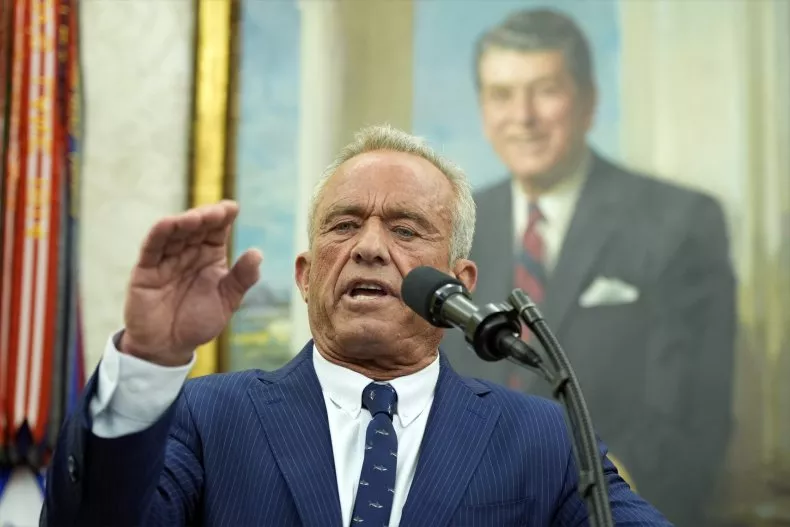The Controversy Unfolds
Robert F. Kennedy Jr.’s recent comments equating the addictive potential of antidepressants to that of heroin have ignited a firestorm within the medical community. Multiple experts have stepped forward to refute these claims, emphasizing the stark differences between the two substances.
Background: RFK Jr. and His Stance on Antidepressants
RFK Jr., despite significant opposition, was recently confirmed as the Secretary of the Department of Health and Human Services. Concerns over his appointment have largely revolved around his controversial views on vaccines, which he insists he does not outright oppose but has frequently criticized for safety concerns. Now, his statements regarding antidepressants have placed him at the center of yet another heated debate.
What Exactly Did RFK Jr. Say?
Kennedy has long been an outspoken critic of the pharmaceutical industry, but his latest remarks—delivered during his confirmation hearing—have drawn particular scrutiny. His concerns align with the objectives of the Make America Healthy Again (MAHA) Commission, an initiative spearheaded by the Trump administration. Established via executive order on February 13, this commission is tasked with evaluating the widespread use of psychiatric medications, including selective serotonin reuptake inhibitors (SSRIs), antipsychotics, and mood stabilizers.
During his hearing, RFK Jr. made a particularly startling claim:
“I know people, including members of my family, who’ve had a much worse time getting off of SSRIs than they have getting off of heroin.”
Medical Community Pushes Back
Medical experts were quick to challenge RFK Jr.’s assertion, dismissing it as both misleading and scientifically unfounded.
-
Dr. Keith Humphreys, a psychiatry and behavioral sciences professor at Stanford University, sharply rebuffed the comparison, stating:
“Antidepressants and heroin are in entirely different realms when it comes to addiction risk. In my 35 years of working in addiction treatment, I have encountered only a handful of individuals who believed they were addicted to antidepressants. By contrast, I have seen thousands struggling with heroin and opioid dependency.” -
Dr. Colin Davidson, a neuropharmacology professor at the University of Central Lancashire, acknowledged that while discontinuing SSRIs can be challenging for some patients, likening their withdrawal to heroin detoxification is a major exaggeration.
“There is considerable evidence that stopping SSRIs can be difficult, but in most cases, it does not come close to the severe withdrawal symptoms associated with heroin addiction,” he explained in The Conversation.
Concerns Over Treatment Access
Following Trump’s executive order launching the MAHA Commission, the International OCD Foundation (IOCDF) voiced concerns over potential restrictions on antidepressant access. A statement released the next day highlighted the gravity of the situation:
“We recognize the importance of addressing mental health challenges in the U.S. However, we are deeply troubled that some directives could severely hinder access to effective treatments for individuals suffering from obsessive-compulsive disorder (OCD) and other psychiatric conditions.”
Why Is RFK Jr. Focused on Antidepressants?
Antidepressants rank among the most frequently prescribed medications in the U.S., with primary care physicians—not psychiatrists—writing the majority of prescriptions, according to the Yale Journal of Biology and Medicine.
The Centers for Disease Control and Prevention (CDC) reports that between 2017 and 2018, approximately 13.2% of American adults were using antidepressants. This figure has likely risen in the wake of the COVID-19 pandemic, which exacerbated mental health struggles nationwide.
While the U.S. Food and Drug Administration (FDA) has acknowledged potential risks, including an increased likelihood of suicidal thoughts and behaviors in adolescents and young adults, it maintains that the benefits of antidepressants outweigh the risks for most patients. The agency’s black-box warning on SSRIs serves as a cautionary measure rather than an outright condemnation of the medication.
Final Thoughts
The backlash against RFK Jr.’s claims underscores the broader debate surrounding psychiatric medication and mental health treatment. While legitimate concerns exist regarding overprescription and withdrawal effects, equating SSRIs to heroin has been widely dismissed as a gross mischaracterization. As the MAHA Commission moves forward, medical professionals will be closely monitoring whether policy decisions are guided by science—or political ideology.
